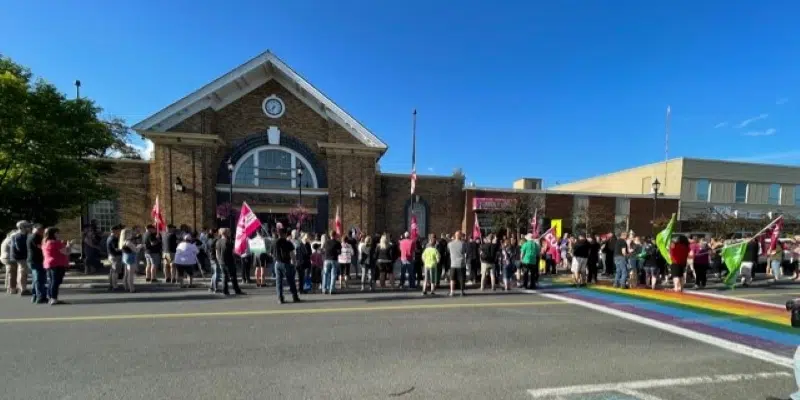A LOCK OUT IS UNION BUSTING
Lockout Continues at Town of Grand Falls-Windsor

(CUPE protest outside Grand Falls-Windsor town hall on July 13.)
Grand Falls-Windsor and its union remain in a dead heat with the lockout now going into its second month. No new talks are scheduled.
One of the issues concerns the medical plan for employees, which is paid for entirely by the town. While the union has been invited to sit on a committee that will review the plan, CUPE says it would not have any say on decisions, opposite the situation which currently exists. They have offered to go to the market to find a new plan.
Union official Tammy Greening says there are many other issues.
They’re concerned about the treatment of casual workers who are on call 24 hours a day, seven days a week for seven months of the year. Greening says they get dinged if they miss a call even if they call back two minutes later.
The town says it has offered a wage increase of 3 per cent over 3 1/2 years but the union wants 6 per cent over that period plus a one per cent increase in pension over the next four years.
What will other towns learn from the Grand Falls-Windsor lockout?
Town locked out its employees a month ago
The plastic Christmas tree almost doesn't seem out of place at the union headquarters in Grand Falls-Windsor.
You probably wouldn't look twice — if it wasn't displayed five months before the holidays.
With time ticking by, and negotiations again at an impasse, the contract dispute between workers and the town of Grand Falls-Windsor is threatening to go long.
One labour relations researcher in Newfoundland and Labrador says however it ends, other towns in the province are keenly interested.
"I think there's lots of towns in Newfoundland and Labrador that are facing some serious, serious budget issues and the likelihood of getting funds from the province pretty darn low," said Gord Cooke, an associate professor at Memorial University with a specialty in labour relations.
"I think that this will be the first of many, many, many disputes like this in the coming months and years."
Dispute details
The contract dispute isn't — strictly speaking — only about pay. The Town of Grand Falls-Windsor locked out its unionized employees on July 15, following months of negotiations with CUPE 1349.
Mayor Barry Manuel says the town's demands, which he has taken the unusual step of publishing online and sharing with his residents, are requests for sustainability.
The town wants the unionized employees to pay for any future increases to the health insurance costs, and wants more power to determine job classifications, descriptions and vacancies on its own.
"We understand that the union has a good contract, a fair contract, and we want that to remain," he said last week. "But we also have to recognize that this is 2021, things have changed. Things will continue to change, particularly financially for municipalities."
CUPE 1349 president Ed White says the town's requests are extraordinary.
"What the town was looking for doesn't exist in other municipal agreements, at least none that I'm aware of," he said.
White says he knows that COVID-19 has changed the fiscal situation for many employers, but he says he hasn't seen anything that could support the town's "ridiculous" proposals.
"We're not opposed to working with employers on those challenges, but it can't be one-sided," he said.
He said taking all responsibility for future health insurance plan increases leaves members vulnerable. What happens, he asks, if expensive, new drugs become more and more mainstream, as Canada's population ages and research and development focus shifts?
"We're not prepared to do that," he says. "It's too risky"
Demands and tactics
Cooke says other municipalities in the province will be paying attention to both Grand Falls-Windsor's requests and their tactics in this labour dispute.
He said that in his experience, people in Newfoundland and Labrador have tended to side with unions in public sector disputes — but COVID-19 and its financial hit may have changed the state of play.
"At times, the benefit package or the pension package... in the public sector exceeds what the private sector folks are getting, and that's been a change in the last 20 to 30 years," he said.
"I think that there is potentially going to be less taxpayer support, less support from the general public toward public sector disputes. And that, in turn, might push towns to be more aggressive."
Public sector negotiations are a multi-part battle, he says, where both the employer and the workers are appealing to the general public for their support.
"I do think that a bunch of towns will be looking to see whether they should maybe be firmer in negotiations," he added. "But the question is, do you have to be this confrontational with your workers — if you think that [Grand Falls-Windsor] is being confrontational?"
As the contract dispute continues, both sides have bemoaned tactics taken on social media.
The town has brought in contractors to continue the garbage pick-up in Grand Falls-Windsor, and the union has responded with pickets following the truck. It's one of the most public aspects of the dispute, given most other town services are continuing with little interruption.
On the picket line, members tell each other to prepare for a long, drawn-out battle.
As the weeks pass, the Christmas tree in the union headquarters — a statement of protest, decked out with tags containing the scribbled wishes of town workers — becomes more and more relevant. White says it's a sign that the union and members aren't close to breaking.
"The message for that is that the members are prepared to to do whatever it takes to to maintain their collective agreement," he said.





No comments:
Post a Comment